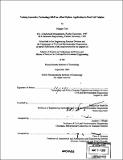| dc.contributor.advisor | Richard de Neufville. | en_US |
| dc.contributor.author | Tsui, Maggie | en_US |
| dc.contributor.other | Massachusetts Institute of Technology. Dept. of Civil and Environmental Engineering. | en_US |
| dc.date.accessioned | 2006-11-07T12:48:50Z | |
| dc.date.available | 2006-11-07T12:48:50Z | |
| dc.date.copyright | 2005 | en_US |
| dc.date.issued | 2005 | en_US |
| dc.identifier.uri | http://hdl.handle.net/1721.1/34541 | |
| dc.description | Thesis (S.M.)--Massachusetts Institute of Technology, Engineering Systems Division, Technology and Policy Program; and, (S.M.)--Massachusetts Institute of Technology, Dept. of Civil and Environmental Engineering, 2005. | en_US |
| dc.description | Includes bibliographical references (leaves 106-115). | en_US |
| dc.description.abstract | This thesis aims to elucidate real option thinking and real option valuation techniques for innovative technology investment. Treating the fuel cell R&D investment as a real option for General Motor's light passenger vehicle fleet, the thesis presents a 3-step approach to value the R&D and its influence on the fleet value, in which the uncertainties and managerial flexibility are proactively accounted for and evaluated. To comprehensively assess the investment, the thesis includes analyses and discussions on fuel cell technology, industry, and related public policies, as well as illustrations and comparisons of various project valuation techniques. It explains in detail the traditional capital budgeting technique, Discounted Cash Flow, and real option valuation techniques such as the finance-based methods and simulation, including their underlying assumptions, analysis of uncertainties, treatments of flexibility, mechanisms, advantages, and limitations. The examination of the project valuation techniques and the GM case leads to the proposed valuation approach that (1) utilizes Monte Carlo simulation to model the uncertainties that affect fleet profit; (2) employs constrained optimization by linear programming to find out the annual optimal fleet profit, | en_US |
| dc.description.abstract | (cont.) and (3) applies NPV analysis and Binomial Approximation to project the evolution of the fleet value, as well as to evaluate the optimal exercise time and the optimal value of the real option. This practical approach captures the complexity in GM's fleet management and offers insight on how its fleet value changes with respect to changes in the product mix of its light passenger vehicle fleet. It also provides an objective justification for a futuristic, highly uncertain investment. The R&D investment alone is estimated to have a negative NPV. However, its payoff essentially lies in the incremental fleet value, which is attributed to the relaxed sales restrictions brought about by commercializing fuel cell vehicles. Possessing and exercising this real option allows GM to market and sell more profitable vehicles within the bounds of production, market, and CAFE constraints. The approach identifies the best commercializing time between 2010 and 2015 in all simulated scenarios and the optimal value of the fuel cell R&D based on a profit-maximizing principle. | en_US |
| dc.description.statementofresponsibility | by Maggie Tsui. | en_US |
| dc.format.extent | 117 leaves | en_US |
| dc.format.extent | 5805122 bytes | |
| dc.format.extent | 5809994 bytes | |
| dc.format.mimetype | application/pdf | |
| dc.format.mimetype | application/pdf | |
| dc.language.iso | eng | en_US |
| dc.publisher | Massachusetts Institute of Technology | en_US |
| dc.rights | M.I.T. theses are protected by copyright. They may be viewed from this source for any purpose, but reproduction or distribution in any format is prohibited without written permission. See provided URL for inquiries about permission. | en_US |
| dc.rights.uri | http://dspace.mit.edu/handle/1721.1/7582 | |
| dc.subject | Technology and Policy Program. | en_US |
| dc.subject | Civil and Environmental Engineering. | en_US |
| dc.title | Valuing innovative technology R&D as a real option : application to fuel cell vehicles | en_US |
| dc.title.alternative | Valuing innovative technology research and development as a real option : application to fuel cell vehicles | en_US |
| dc.type | Thesis | en_US |
| dc.description.degree | S.M. | en_US |
| dc.contributor.department | Massachusetts Institute of Technology. Department of Civil and Environmental Engineering | |
| dc.contributor.department | Massachusetts Institute of Technology. Engineering Systems Division | |
| dc.contributor.department | Technology and Policy Program | |
| dc.identifier.oclc | 71003463 | en_US |
